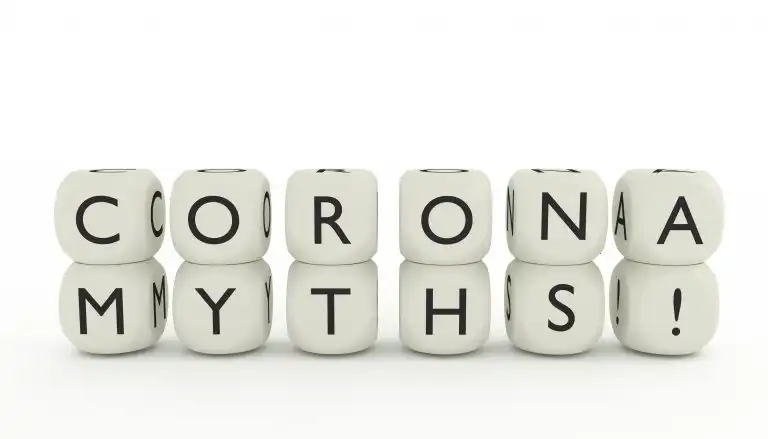Coronavirus (COVID-19) outbreak in India has brought several misconceptions and rumors with it. Myths are spreading faster than the viral infection itself. At this crucial time, it is very important not to panic and information should be consumed from authorized sources only – healthcare providers, medical institutions, government portals, WHO, etc. are the authentic bodies.
Myth 1 – Antibiotics can prevent and treat coronavirus infection.
Fact – NO, antibiotics cannot treat viral infection. They are used to kill or inhibit the growth of bacteria. The Coronavirus strain – 2019-nCoV belongs to a large family of viruses and, therefore antibiotics cannot be the preventive measure.
Myth 2 – Coronavirus affects older people only.
Fact – People from all age group are susceptible to coronavirus infection. However, older people and people suffering from medical conditions such as asthma, diabetes, or any heart disease, or with low immunity are more vulnerable to this viral infection.
Myth 3 – Regularly rinsing nose with saline can help prevent coronavirus infection.
Fact – NO, regularly rinsing nose with water, saline or any chemical can’t prevent coronavirus infection. It may help in getting quick relief from the common cold and prevent other respiratory infections.
Myth 4 – Putting on sesame oil on skin kills coronavirus or prevents them from entering the body?
Fact – Sesame oil can’t kill or prevent coronavirus. Few chemicals that do kill COVID-19 on surfaces include bleach/chlorine-based disinfectants, ether solvents, 75% ethanol, peracetic acid, and chloroform.
Myth 5 – Eating garlic help prevent infection of COVID-19 coronavirus.
Fact – Garlic is healthy food and is loaded with antimicrobial properties but, it has no such antiviral effects which can cure coronavirus infection.
Myth 6 – The pneumonia vaccine can prevent coronavirus infection.
Fact – NO, the vaccine used for pneumonia does not provide any protection against the coronavirus infection. COVID-19 is a new virus and researchers are trying to develop an effective vaccination for the same. But, currently, we have no vaccine for coronavirus.
Myth 7 – Applying cow dung or consuming cow urine can cure or prevent coronavirus infection.
Fact – Absolutely NO, There is no scientific evidence that cow dung or cow urine can cure COVID-19.
Myth 8: You can protect yourself from COVID-19 by swallowing or gargling with bleach, taking acetic acid or steroids, or using essential oils, salt water, ethanol or other substances.
Fact :None of these recommendations protects you from getting COVID-19, and some of these practices may be dangerous. The best ways to protect yourself from this coronavirus (and other viruses) include:
Washing your hands frequently and thoroughly, using soap and hot water.
Avoiding close contact with people who are sick, sneezing or coughing.
In addition, you can avoid spreading your own germs by coughing into the crook of your elbow and staying home when you are sick.
Myth 9: A face mask will protect you from COVID-19.
Fact : Certain models of professional, tight-fitting respirators (such as the N95)can protect health care workers as they care for infected patients .
For the general public without respiratory illness, wearing lightweight disposable surgical masks is not recommended. Because they don’t fit tightly, they may allow tiny infected droplets to get into the nose, mouth or eyes.
Also, people with the virus on their hands who touch their face under a mask might become infected.
Myth 10: COVID-19 is just like the flu
Fact :SARS-CoV-2 causes illness that does, indeed, have flu-like symptoms, such as aches, fever, and cough. Similarly, both COVID-19 and flu can be mild, severe, or, in rare cases, fatal. Both can also lead to pneumonia.
Myth 11: Everyone with COVID-19 dies
Fact :This statement is untrue. As we have mentioned above, COVID-19 is only fatal for a small percentage of people.The WHO also report that around 80% of people will experience a relatively mild form of the disease, which will not require specialist treatment in a hospital.Mild symptoms may include fever, cough, sore throat, tiredness, and shortness of breath.
Myth 12: Cats and dogs spread coronavirus
Fact :Currently, there is little evidence that SARS-CoV-2 can infect cats and dogs. The real driver of the outbreak is humans.”
“Furthermore, wearing masks can give a false sense of reassurance and might lead to other infection control practices being ignored, e.g., hand hygiene.”
The WHO recommend that people who are caring for someone with suspected COVID-19 should wear a mask. In these cases, wearing a mask is only effective if the individual regularly washes their hands with alcohol-based hand rub or soap and water.
Also, when using a mask, it is important to use it and dispose of it properly.
Myth 13: SARS-CoV-2 is just a mutated form of the common cold
Fact :Coronaviruses are a large family of viruses, all of which have spiky proteins on their surface. Some of these viruses use humans as their primary host and cause the common cold. Other coronaviruses, such as SARS-CoV-2, primarily infect animals only .
Myth14: The virus will die off when temperatures rise in the spring
Some viruses, such as cold and flu viruses, do spread more easily in the colder months, but that does not mean that they stop entirely when conditions become milder. As it stands, scientists do not know how temperature changes will influence the behavior of SARS-CoV-2.
Myth 15: Coronavirus is the deadliest virus known to man
Although SARS-CoV-2 does appear to be more serious than influenza, it is not the deadliest virus that people have faced. Others, such as Ebola, have higher mortality rates.
Myth 16: Flu and pneumonia vaccines protect against COVID-19
As SARS-CoV-2 is different than other viruses, no existing vaccines protect against infection.


















